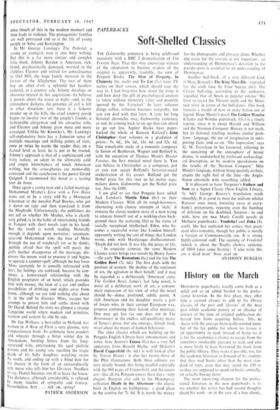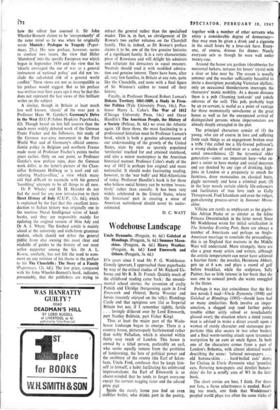History on the March
HISTORICAL paperbacks usually come both as a relief and as an added burden to the profes- sional historian. In the first place, they offer him a secured chance to add to his library classics of the past and 'classics' of the near past which academic penury or an absence of interest at the time of original publication de- barred him from acquiring before. This he shares with the average historically-minded mem- ber of the lay public for whom his leisure is an opportunity to read, instead of being (as it is for the academic) a chance to escape from the sometimes intolerable pressure to read, and who is more likely to have borrowed the book from the public library. They make it possible, too, for the academic historian to demand of his students that they read books other than the most stan- dard of texts, even that they spend the f30 or so they are supposed to spend on books annually, on actually buying them.
The most interesting element for the profes- sional historian in the new paperbacks is to see whether the writer has had second thoughts about his work—or in the case of a true classic,
how the editor has assessed it. Sir John Wheeler-Bennett claims to be 'unrepentantly' of the same mind as he was when he originally wrote Munich : Prologue to Tragedy (Paper- macs, 25s.). His new preface, however, seems to confuse two issues, the view that Hitler `blundered' into the specific European war which began in September 1939 and the view that he `clearly envisaged the use of war as a general instrument of national policy' and did not 'ex- clude the calculated risk of a general world conflict.' These views are not as incompatible as his preface would suggest. But as his preface was written over four years ago it may be that this does not represent the last views of this brilliant writer on the subject.
A similar, though in Britain at least much less well known, 'classic' of the near past is Professor Hans W. Gatzke's Germany's Drive to the West (O.U.P./Johns Hopkins Paperbacks, £1). Though based on less full sources than the much more widely debated work of the German Franz Fischer and his followers, this study of the German war-aims movement in the rust World War and of Germany's official annexa- tionist policy in Belgium and northern France made most of Professor Fischer's points twelve years earlier. Only on one point, so Professor Gatzke's new preface runs, does the German work differ, in the latter's picture of the Chan- cellor Bethmann Hollweg as 'a cool and cal- culating Machiavellian,' a view which many still find difficult to reconcile with his general 'bumbling' attempts to be all things to all men.
Dr P. Whaley and D. H. Hearder do not feel the need for any new introduction to their Short History of Italy (C.U.P., 12s. 6d.), which is explained by the fact that this excellent intro- duction to Italian history was originally one in the wartime Naval Intelligence series of hand- books, and they are responsible mainly for Updating the original version of Miss Ady and Dr A. J. Whyte. The finished article is mainly aimed at the university and sixth-form grammar student, which should not debar the general public from also owning this most clear and readable of guides to the history of our most active supporter among the Six. Dr A. L Rowse, similarly, has not felt the need to com- ment on any revision of his theme in the preface to his The Churchills : The Story of a Family (Papermacs, 12s. 6d.). The low price, compared with Sir John Wheeler-Bennett's book, indicates, presumably, that the publishers are trying to
attract the general rather than the specialised reader. This is, in fact, an abridgement of Dr Rowse's two earlier volumes on the Churchill family. This is, indeed, as Dr Rowse's preface claims it to be, one of the few genuine histories of a significant family. It is a very characteristic piece of Rowsiana and will delight his admirers and infuriate his detractors in equal measure. Neutrals should read it with modified admira- tion and genuine interest. There have been, after all, very few families, in Britain at any rate, quite like the Churchills, and none with a final figure of Sir Winston's calibre to round off their history.
Finally, in Professor Howard Robert Laman's Dakota Territory 1861-1889, a Study in Fron- tier Politics (Yale Univeisity Press, 14s.), Pro- fessor Harry L. Coles's The War of 1812 (Chicago University Press, 14s.) and Oscar Handlin's The American People, the History of a Society (Pelican, 8s. 6d.) we cross the Atlantic again. Of these three, the most fascinating to a professional historian must be Professor Laman's book, which is both a genuine advancement of our understanding of the growth of the United States, state by state as sparsely populated `territories' reached for and attained statehood, and also a minor masterpiece in the American historical manner. Professor Coles's study of the war of 1812 is perhaps less original and more nationalist. It should make fascinating reading, however, to the 'war buffs' and Mid-Atlanticists of today. Professor Handlin's book is for those who believe social history can be written 'evoca- tively' rather than causally. It has been very widely celebrated in the United States, where the historians' part in creating a sense of American nationhood should never be under- estimated.
D. C. WATT



































 Previous page
Previous page